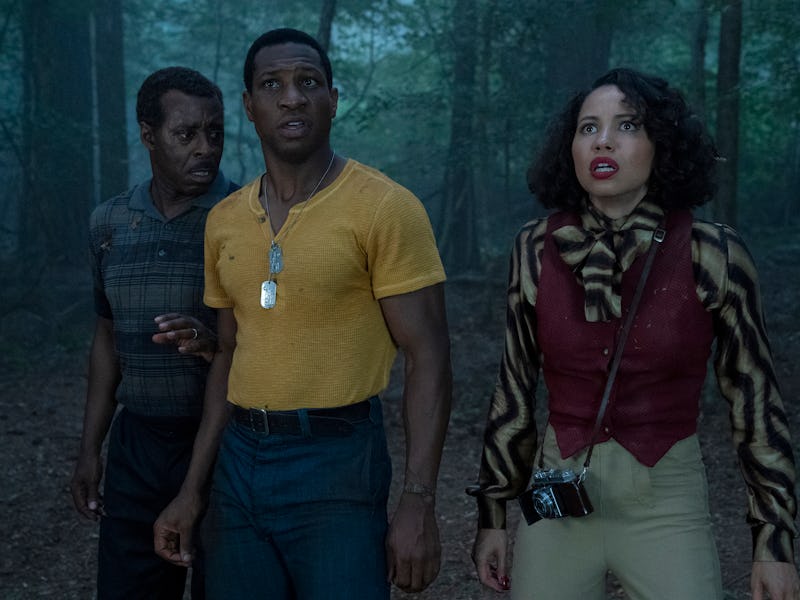How H.P. Lovecraft's racist poem sets the tone for HBO's Lovecraft Country
The new HBO series pulls no punches on the prejudices of H.P. Lovecraft. It's even worse than you could imagine.

In the first episode of HBO's Lovecraft Country, a new show based on the 2016 novel by Matt Ruff, science fiction fanboy Atticus (Jonathan Majors) returns from the front lines of the Korean War to his home in Chicago. In his uncle's Black-friendly travel agency, Atticus pulls out The Outsider and Others, a 1939 anthology by 19th/20th century New England author H.P. Lovecraft. He speaks aloud the title of a poem, "On the Creation of N*ggers."
The title stops his uncle (Courtney B. Vance) in his tracks. "Well, that's one of Lovecraft's we don't hear mention often."
Atticus further reveals that his father forced him to memorize the poem — punishment for engaging with Lovecraft's "pulp trash." His father wasn't wrong. Why indulge in works that dehumanizes your identity as "a beast" wrought in "semi-human figure?" Filled it with vice, and called the thing a N*gger, reads the last line of the short poem.
As the poem's title suggests, Lovecraft imagines the making of Black people as an actual afterthought by the gods of Earth. It's a short poem and was written in 1912 by Lovecraft roughly at the age of 22. Little else is known about it. But it exists, and Lovecraft Country makes that clear in Episode 1.
Jonathan Majors stars in the HBO series 'Lovecraft Country,' based on the 2016 novel by Matt Ruff.
To say H.P. Lovecraft was a virulent racist is not a new claim. Lovecraft, who lived much of his life as a shut-in and expressed insecurities about his own failings, imbued his fear of the unknown into his now celebrated "weird fiction" tales. The Lovecraft Universe is chock full of oversized deities — with names like "Azathoth" and "C'thulhu" — whose ultimate power isn't in their quest to control us or eat us but to ignore us. The big idea behind Lovecraft's work is how the cosmos is too much for mortal minds to comprehend. We are but ants before beings like C'thulhu.
Lovecraft, though he had a brilliant imagination and his prose ranged from wonderful to whatever, was in his own way a monster. Even for a 19th/20th century New Englander (Lovecraft's home was Providence, Rhode Island), Lovecraft's own peers thought his prejudices were a bit much. Early in his writing career, Lovecraft published The Conservative, a self-edited and published journal where Lovecraft expressed hatred for anybody not white. Not only Black people. Jews, Asians, and the "subhuman Russian rabble" all received Lovecraft's resentment for their presence and threatening to undo the so-called purity of the white race.
“I regard the Celts as an inferior race," Lovecraft wrote in a June 1916 letter to Rheinhart Kleiner, "but little better than Mexicans, and but little more capable of self government.”
Tellingly, Lovecraft's wife of two years, Sonia Greene, was a Jewish Russian immigrant who was known to have had a lively, outgoing personality — a stark contrast to Lovecraft himself. While Greene wrote in a 1985 memoir The Private Life of H.P. Lovecraft that her former husband was an "adequately excellent lover," the mental gymnastics Lovecraft went through to marry a Russian-born Jewish woman remains as mysterious as the Necronomicon.
H.P. Lovecraft, in the 2008 documentary film 'H.P. Lovecraft: Fear of the Unknonw.'
So, it's not surprising Lovecraft would have a poem as vile as "On the Creation." There is little known about the poem's origins. Its notoriety is that it is held up as a very obvious example of Lovecraft's prejudices. But the actual purpose and inciting incident for its existence is unclear. It simply exists in his canon.
It isn't hard to see how Lovecraft premised the weird fiction genre with the root cause for racism: The fear of something foreign. While it's not accurate to say C'thulhu is a metaphor for his beliefs in the same way Godzilla is for nuclear war, many of Lovecraft's tales are inundated by fanatical, primal cults who speak in indecipherable tongues and worship something ancient, old, and conventionally immoral. In a January 2020 episode of The New Yorker Radio Hour, N.K. Jemisin wrote that Lovecraft's racism was "the basis" of his horror fiction.
"He does some incredible imagery, it's powerful work, but it's frightening," Jemisin said, "because it's a way to look into the mind of a true bigot, and realize just how alien their thinking is, just how disturbing their ability to dehumanize their fellow human beings is."
The brilliance of Lovecraft Country, overseen by showrunner Misha Green, is how it directly pits the eldritch evils of weird fiction with Black heroism. Though the show has just begun, it doesn't waste time with its opening image of Jackie Robinson swinging at C'thulhu. Though Lovecraft made and defined horror fiction, it doesn't have to belong to just him now.
Lovecraft Country airs Sundays at 9 p.m. Eastern on HBO.